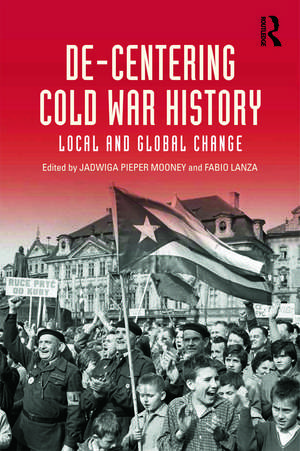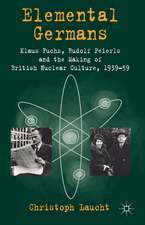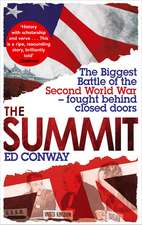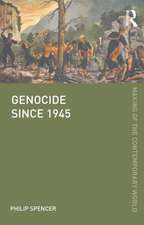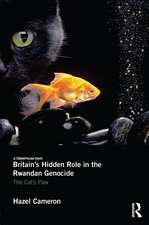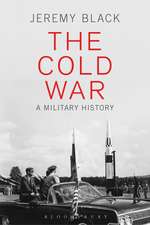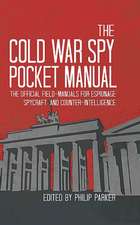De-Centering Cold War History: Local and Global Change
Editat de Jadwiga E. Pieper Mooney, Fabio Lanzaen Limba Engleză Paperback – 24 oct 2012
Contributions from an international group of scholars take a fresh look at historical agency in different places across the world, including Africa, Asia, Europe and the Americas. This collaborative effort shapes a street-level history of the global Cold War era, one that uses the analysis of the 'local' to rethink and reframe the wider picture of the 'global', connecting the political negotiations of individuals and communities at the intersection of places and of meeting points between 'ordinary' people and political elites to the Cold War at large. Essential reading for all students of Cold War history.
| Toate formatele și edițiile | Preț | Express |
|---|---|---|
| Paperback (1) | 387.49 lei 6-8 săpt. | |
| Taylor & Francis – 24 oct 2012 | 387.49 lei 6-8 săpt. | |
| Hardback (1) | 1006.43 lei 6-8 săpt. | |
| Taylor & Francis – 24 oct 2012 | 1006.43 lei 6-8 săpt. |
Preț: 387.49 lei
Nou
Puncte Express: 581
Preț estimativ în valută:
74.17€ • 77.14$ • 62.15£
74.17€ • 77.14$ • 62.15£
Carte tipărită la comandă
Livrare economică 14-28 martie
Preluare comenzi: 021 569.72.76
Specificații
ISBN-13: 9780415636407
ISBN-10: 041563640X
Pagini: 256
Ilustrații: 4
Dimensiuni: 156 x 234 x 20 mm
Greutate: 0.41 kg
Ediția:New.
Editura: Taylor & Francis
Colecția Routledge
Locul publicării:Oxford, United Kingdom
ISBN-10: 041563640X
Pagini: 256
Ilustrații: 4
Dimensiuni: 156 x 234 x 20 mm
Greutate: 0.41 kg
Ediția:New.
Editura: Taylor & Francis
Colecția Routledge
Locul publicării:Oxford, United Kingdom
Public țintă
Postgraduate and UndergraduateCuprins
Introduction. Part I: Cold War Activisms: Crossing Borders and Building Bridges 1. Thermonuclear Weapons and Tuna 2. The Cold War and Transnational Links 3. Fighting Fascism and Forging New Political Activism Part II: Separating Enemies from Friends: Communism, Anticommunism, and the Construction of Cold War Realities 4. Cold War Happiness 5. New Men of Power 6. Female Terrorists and Vigilant Citizens. Gender, Citizenship and Cold War Direct Democracy Part III: Rethinking Opposition and Conformity 7. Making Sense of "China" during the Cold War 8. Anti-Communist Entrepreneurs and the Anti-"Peace" Campaigns in Latin America 9. A "New Man" for Africa? Some Particularities of the Marxist Homem Novo Within Angolan Cultural Policy 10. The Cold War and Orange County
Recenzii
‘The driving motivation behind the book is the wish to bring out how the grand narratives and brutal forces of the Cold War were experienced at the individual and local level across different regions of the world, a task it succeeds in with a table of contents that ranges across Japan, Indonesia, Hungary, Switzerland, Latin America, Angola, as well as a handful of US focused “alternative histories…They [the essays] are also inspirational in terms of exploring new social and political fields of investigation.’ - Giles Scott-Smith, Leiden University
Descriere
Cold War histories are often told as stories of national leaders, state policies and the global confrontation that pitted a Communist Eastern Bloc against a Capitalist West. De-Centering the Cold War takes a new analytical approach to reveal unexpected complexities in the historical trajectory of the Cold War.
This collaborative effort shapes a street-level history of the global Cold War era, one that uses the analysis of the 'local' to rethink and reframe the wider picture of the 'global', connecting the political negotiations of individuals and communities at the intersection of places and of meeting points between 'ordinary' people and political elites to the Cold War at large.
This collaborative effort shapes a street-level history of the global Cold War era, one that uses the analysis of the 'local' to rethink and reframe the wider picture of the 'global', connecting the political negotiations of individuals and communities at the intersection of places and of meeting points between 'ordinary' people and political elites to the Cold War at large.
